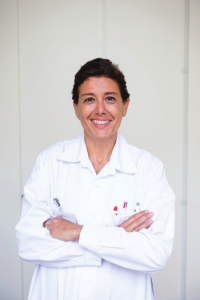Professor Begoña Martinez de Tejada Weber, Director of the Geneva Maternity Hospital from October 1, is enthusiastically preparing to take on a number of challenges in the fast-changing world of obstetrics. A fighter, the Catalan-born Genevan, with a brilliant academic and professional record, was appointed this spring at a time when she was fighting one of her greatest battles, that of breast cancer.
 In her brand-new office, perched atop the brand-new building of the Geneva Maternity Hospital, Begoña Martinez de Tejada Weber displays the optimism of a born enthusiast. As the first woman to be appointed General Manager of Obstetrics at the Geneva Maternity Hospital, she is well aware of the scale of the task and the challenges ahead. In the 16 years I've spent working in the various departments, I've been able to observe both the technological and human evolution of the maternity unit at Switzerland's largest university hospital," confides the professor who, along with Professor Patrick Petignat, succeeds Professor Olivier Irion, who reigned over the Geneva maternity unit for more than 15 years. I'm taking over the reins of obstetrics, while Professor Petignat is in charge of gynecology and the department," explains Professor Petignat, who for many years was deputy head of obstetrics and assistant professor at the Faculty of Medicine.
In her brand-new office, perched atop the brand-new building of the Geneva Maternity Hospital, Begoña Martinez de Tejada Weber displays the optimism of a born enthusiast. As the first woman to be appointed General Manager of Obstetrics at the Geneva Maternity Hospital, she is well aware of the scale of the task and the challenges ahead. In the 16 years I've spent working in the various departments, I've been able to observe both the technological and human evolution of the maternity unit at Switzerland's largest university hospital," confides the professor who, along with Professor Patrick Petignat, succeeds Professor Olivier Irion, who reigned over the Geneva maternity unit for more than 15 years. I'm taking over the reins of obstetrics, while Professor Petignat is in charge of gynecology and the department," explains Professor Petignat, who for many years was deputy head of obstetrics and assistant professor at the Faculty of Medicine.
Fire temperament and solar enthusiasm
The untouched white walls of the dining room, with its panoramic view of the Salève, reflect a luminosity in harmony with the new chef's sunny personality. Van Gogh's famous painting of colorful boats on the beach at Les Saintes Marie de la mer sits on a shelf, symbolizing the Barcelona-born chef's connection to the Mediterranean. I haven't moved all my stuff yet," she apologizes in a lilting accent winding through her rather deep voice. But behind her warm Southern drawl, you can tell she has a fiery temperament. I'm sometimes a little too bossy," she readily admits. I'm very demanding with myself, so I become demanding with others. And I sometimes forget to give it my best shot...".
Defect or quality? I think it's important to be clear about things, not to waffle," says the new head of obstetrics. We work with women and children, and the slightest mistake can have serious consequences. But while I can be a little harsh at times, particularly when dealing with someone who doesn't take responsibility, I'm also always there to talk things through afterwards. We have to learn from our mistakes, question ourselves to improve. And move forward!"
Technological developments in obstetrics
Over the past 30 years, care has evolved from being based mainly on obstetric mechanics to becoming more medical and, above all, technical. While over 60% of pregnancies are now classified as high-risk, maternal mortality has virtually disappeared, and advances in neonatology have drastically increased the chances of survival for premature babies and babies born with complicated pathologies.
Ultrasound, for example, has greatly improved prenatal diagnosis," explains Begoña Martinez de Tejada Weber. Malformations and foetal distress are detected more quickly. Multidisciplinary teams now monitor at-risk patients and intervene directly on the mother or child in cases of vital need."
The development of specific sectors, such as the care of diabetic patients, obesity-related risks and psychological pathologies, is also close to the heart of the woman who will continue to devote at least 20% of her time to her patients. "I mainly follow high-risk pregnancies, complicated maternal pathologies and private patients who wish to be looked after by a professor.
The new manager's main objective is to further improve the quality of care and services. "I remain attentive to the well-being of patients and babies, as well as to the working conditions of our staff," insists the woman who has worked her way up the maternity ladder in most sectors.
4,100 babies a year
The maternity unit at Geneva's Cantonal University Hospital (HUG) is a 24-hour ant farm, delivering more than 4,100 babies a year, and more than 60% of its work is in emergencies. We have to adapt constantly, which demands a high level of professionalism from our teams," she stresses. Geneva is fortunate to be able to offer cutting-edge care and technology. A reputation that extends beyond our borders, with women even arriving from abroad to give birth or undergo surgery here. But this success, and the steady increase in patient numbers over the past decade, also has its downside. Not least for the staff, who often combine care with administrative tasks.
We need to find solutions to lighten these additional burdens, so that midwives can devote even more time to patients and babies," she acknowledges. "With the new maternity unit, we'll increase the number of delivery rooms from eight to twelve, and we'll also gain more beds and workstations," she enthuses.
Feminist committed to recognition
A committed feminist, Begoña Martinez de Tejada Weber sees the HUG maternity unit as a good reflection of society. There are a lot of women in the field, in the departments, but as soon as you climb the hierarchical ladder, female representation drops dramatically," observes the woman who was the first female professor of gynecology in Geneva and the third in Switzerland. And yet, on the face of it, gynecology and obstetrics are mainly a female field. "Fortunately, this is changing, but there's still work to be done.
His appointment overturns a hierarchical reality, accrediting his skills and consecrating a career path that began with studies in internal medicine in Barcelona. "I went on to specialize in gynecology and to do a sub-specialization in gynecological infectious diseases in the United States. Back in Catalonia, she practiced obstetrics for a few years before settling in Geneva with her Swiss husband in 2001. "We met in Barcelona, and I was ready to come to Switzerland, but from French-speaking Switzerland! she jokes.
Her appointment as head of the Geneva Maternity Hospital also comes at a pivotal moment in her life. Begoña Martinez de Tejada Weber was chosen over other Swiss and international candidates, despite being diagnosed with breast cancer last summer. "I'm glad the illness wasn't an obstacle or an argument to keep me out", she admits, since it was during her treatment that she interviewed for the job. The irony of a fate linked to a pathology for which she has spent several years caring and accompanying patients.
After a few months of enforced rest, interspersed with reading (I'm a literature bulimic) and writing obstetrics research articles, Begoña Martinez de Tejada Weber was already on deck, 100%, 55 hours a week, with the motivation of a lioness! "At first, I hesitated to maintain my candidacy, but in the end, I think it carried me too, and I'm happy to have gone all the way, to be here, here, now."
A challenge she decided to take up at the age of 51, encouraged by those close to her, her two daughters and her husband. My family was already living with the beeps and consequences of my commitment to motherhood," she smiles. I can still see myself at the cinema checkout with my daughters, having to rush off to the hospital or disappear in the middle of the night for an emergency."
By accepting the position of general manager, she explodes the altimeter of responsibilities. And professional commitments. "But I'm still very close to my daughters. We've managed to maintain a harmonious quality of life," adds the youngest of four children. I saw my mother sacrifice her life to raise us, give up her teaching career and lose all independence. I think that my passion for my job and my dedication also give my daughters a positive image, and I wish them independence, autonomy and fulfillment in a life of their own choosing."
How about you? "I feel ready for what's next! We'll see, professionally, the most important thing for me is to manage to unite everyone around a common project for maternity."


